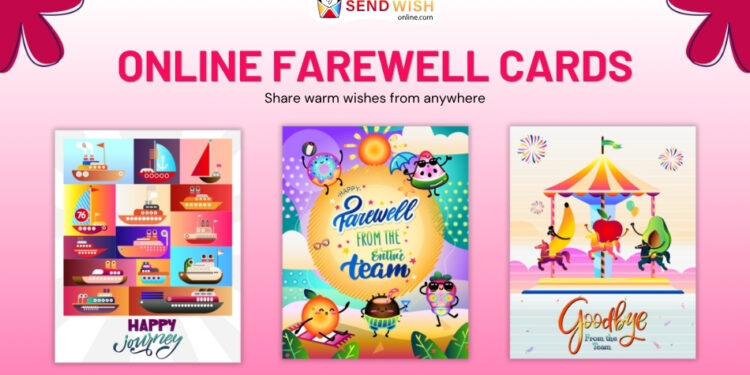Farewell cards are more than just a tradition; they are a heartfelt way to express gratitude and appreciation when a coworker leaves the company. In many office cultures, they play a significant role in saying goodbye, creating lasting memories, and maintaining a sense of camaraderie. Though they may seem like a small gesture, farewell cards can carry deep meaning, making a significant impact on both the person leaving and the team they leave behind.
Why Farewell Cards Matter in Office Culture
Farewell cards are a meaningful element of office culture for several key reasons:
- A Platform for Expressing Emotions Saying goodbye can stir up emotions that may be difficult to express face-to-face. A farewell card provides a safe and thoughtful way for coworkers to articulate their feelings, share memories, and offer words of encouragement. Whether it’s sadness over a colleague’s departure or excitement for their next chapter, a card gives space to communicate emotions that might otherwise be left unsaid.
- Strengthening Relationships Taking the time to write a personalized farewell message shows that you genuinely care about the individual. This simple act of writing a card can help reinforce relationships and build lasting bonds, even after the person has left the workplace. For those leaving, it’s a reminder of the connections they’ve made and the appreciation others have for them.
- Fostering a Sense of Community A coworker’s departure can leave a noticeable gap in the team. Farewell cards help to maintain a sense of unity and belonging within the workplace, despite the inevitable changes that come with someone leaving. They remind everyone that they are still part of a cohesive team, helping to preserve the office’s spirit and culture even as it evolves.
- Celebrating New Beginnings While goodbyes can be sad, farewell cards also celebrate the new opportunities and adventures that lie ahead for the departing coworker. Whether they’re moving on to a new job, relocating, or retiring, a farewell card is a chance to acknowledge their accomplishments and wish them well in the next stage of their journey.
The Impact of Farewell Cards
The emotional and psychological benefits of farewell cards in office culture are significant, extending beyond just the person leaving. Here’s how they impact the workplace:
- Boosting Morale When a colleague leaves, it can be a time of uncertainty for those remaining. A thoughtful farewell card can boost team morale, helping to ease the transition by reminding employees that they are still a valued part of the organization. This simple act of appreciation can uplift the entire team.
- Building and Maintaining Relationships Writing a farewell card allows coworkers to reaffirm their connection with the person leaving. It can also be a way to maintain professional relationships long after someone has moved on. For those who might not have had a chance to say goodbye in person, the card becomes a meaningful bridge between past and future interactions.
- Providing a Cherished Keepsake A well-written farewell card can be a treasured keepsake for the departing employee. These cards often serve as a reminder of the positive impact they had on their team and the relationships they built. For the recipient, the card can bring comfort and nostalgia in moments of reflection.
- Easing the Transition Farewell cards can also help reduce stress and anxiety for those who are leaving. Knowing they are appreciated and valued makes the transition smoother, fostering a sense of closure and support as they move forward.
Studies Highlight the Importance of Farewell Cards
Several studies emphasize the positive impact that farewell cards have on office culture and employee well-being:
- A University of California, Berkeley study found that employees who received farewell cards felt more supported by their colleagues and were more satisfied with their work experience.
- A Society for Human Resource Management survey revealed that 70% of employees said they would be more inclined to stay with a company if they received a farewell card when leaving.
- Research from the Harvard Business Review indicated that farewell cards can reduce stress and anxiety for employees transitioning to a new job or life stage.
These findings highlight the powerful role that farewell cards play in maintaining a healthy, supportive office environment.
Tips for Writing a Memorable Farewell Card
A farewell card doesn’t need to be elaborate, but it should be thoughtful and personal. Here are some tips to make your card stand out:
- Be Sincere and Heartfelt Authenticity is key. Share your genuine feelings, whether it’s appreciation, gratitude, or a lighthearted message. Reflect on the unique relationship you have with the person leaving.
- Share Specific Memories Personalized messages resonate more deeply. Mention shared experiences or specific memories that have stood out during your time working together.
- Acknowledge Their Impact Let the person know how they have made a positive difference, either in your life or in the workplace. This recognition can make the card feel even more meaningful.
- Wish Them Well Close your message by offering good wishes for their future, whether it’s success in their next role, happiness in a new city, or joy in retirement.
- Keep it Positive While goodbyes can be sad, try to focus on the positive. Celebrate the time you spent together and the exciting opportunities ahead for the person leaving.
Conclusion: Farewell Cards as a Pillar of Office Culture
Farewell cards hold a special place in office culture, offering an opportunity to express gratitude, strengthen relationships, and celebrate new beginnings. By taking the time to write a heartfelt card, you not only say goodbye in a meaningful way but also leave a lasting impression on both the recipient and the rest of the team. In an environment that values relationships and community, farewell cards become an essential tradition that can uplift morale and foster lasting connections.










